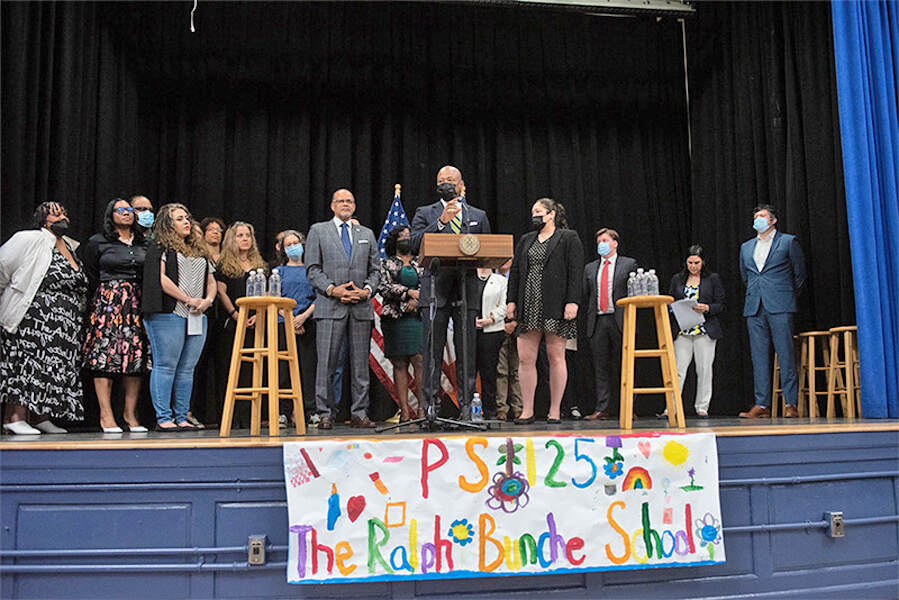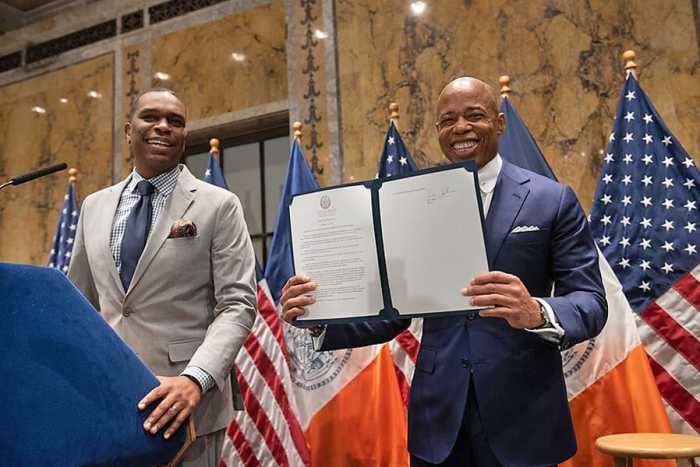New York City Mayor, Eric Adams and New York City Department of Education (DOE) Chancellor, David C. Banks on Thursday announced the largest, most comprehensive approach to supporting public school students with dyslexia in the United States.
For the first time, all New York City public school students will be assessed for being at risk of dyslexia, be supported in their neighborhood school, and receive specialized instruction through the development of special programs and academies.
“As a student, I struggled with identifying my dyslexia until long after leaving the public school system,” Adams said. “Today, we are announcing the most comprehensive approach to supporting dyslexic students in New York City to prevent students from experiencing that disadvantage.
“By changing the way we approach dyslexia, we can unlock the untapped potential in students who may feel insecure about their dyslexia or any other language-based learning disabilities they may have,” he added.
“Early screening ensures that every child who needs support will get the help and resources they need,” said Chancellor Banks. “These screeners are emblematic of this administration’s commitment to uplifting all of our students and making sure they are well equipped to succeed.”
“Every student deserves the resources and support needed to thrive in our schools,” said Deputy Mayor for Strategic Initiatives Sheena Wright. “Today’s announcement on Dyslexia Awareness Day brings us one step closer to living up to that promise. From universal screenings to first-of-its-kind pilots, New York City is leading the way in building a more equitable school system and committing to a comprehensive investment in dyslexic students.”
Beginning in fall 2022, the mayor said the DOE will pilot two first-of-their-kind programs within New York City public schools, where 80 elementary schools and 80 middle schools across the city will receive targeted support and training to screen and identify students at risk for dyslexia and provide targeted interventions.
Every student will participate in short, adaptive literacy screeners as part of the pilot at these schools, Adams said.
He said all schools will be supported by district-based Academic Intervention Support coordinators on how to adjust core instruction and provide intervention when screeners, and other evidence of student work, indicate that students are not making adequate progress.
By offering accessible screening across the city, Mayor Adams and Chancellor Banks are breaking down a major barrier that has faced working families for many years.
For the first time, every child from every zip code will have this important opportunity afforded to them, free of charge.
Adams said identifying student needs at an early age while breaking down cost barriers is a win for students, working families and school communities across the city.
In addition, Literacy Academy Collective in P.S. 161 in the Bronx and Lab School for Family Literacy in P.S. 125 in Manhattan will both offer specialized programs for students with dyslexia and other language-based learning disabilities.
Adams said the DOE will immediately move to build programs at additional schools with the goal of having at least one school offering specialized instruction in each borough by fall 2023.
He said teachers are the city’s most valuable partners in reimagining literacy instruction in schools.
By April 2023, the mayor said all teachers in kindergarten through 12th grade will participate in Made by Dyslexia’s two-hour introductory training.
“Teachers across the city will have opportunities to participate in training for evidence-based reading programs grounded in explicit phonics techniques, including Wilson and Orton-Gillingham,” he said. “Teachers will receive additional job-embedded literacy support from trained literacy coaches across all grade levels in targeted schools.”
As previously announced, over the course of the next year, the DOE will require teachers in grades K-2 to have a phonics-based, proven foundational literacy curriculum.
Keeping Chancellor Banks’ promise, the DOE Central Literacy Team convened a Literacy Advisory Council of local community members, experts in literacy, public school staff, students, and parents to help guide the rollout of this and future literacy initiatives.
Additionally, the DOE is launching a Dyslexia Task Force that will develop a policy paper on the New York City public schools’ vision and approach to supporting students at risk of and/or living with dyslexia inclusive of multilingual learners and students from communities of dense dialect. The DOE looks to have this done by August 2022.
This announcement came on the heels of the World Dyslexia Assembly that took place last week in Stockholm, Sweden.
Adams said New York City will host the next assembly in spring 2023 as “a sign of the city’s commitment to supporting dyslexic students citywide.”


























